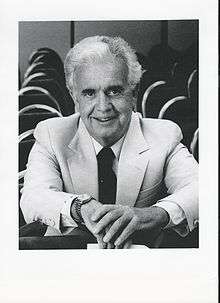Frank J. Kelley
| Frank J. Kelley | |
|---|---|
 | |
| 50th Michigan Attorney General | |
|
In office December 28, 1961 – January 1, 1999 | |
| Governor |
John Swainson George W. Romney William Milliken James Blanchard John Engler |
| Preceded by | Paul L. Adams |
| Succeeded by | Jennifer Granholm |
| Personal details | |
| Born |
Frank Joseph Kelley December 31, 1924 Detroit, Michigan, U.S. |
| Political party | Democrat |
| Alma mater | University of Detroit |
| Occupation | lawyer |
Frank Joseph Kelley (born December 31, 1924), was the 50th Attorney General of the U.S. state of Michigan.[1] His 37-year term of office, from 1961 to 1999, made him both the youngest (36 years old) and oldest (74 years old) Attorney General in the state's history, and led to his nickname as the "Eternal General." He is the longest serving state attorney general in U.S. history.
After receiving undergraduate and law degrees from the University of Detroit, Kelley became a lawyer in private practice in Alpena, Michigan, and later received an appointment as Alpena city attorney.
Kelley was appointed as Attorney General in 1961 by Governor John Swainson to fill a vacancy left when Paul L. Adams became a Justice of the Michigan Supreme Court. Kelley was elected in his own right as the Democratic candidate ten (10) times before his retirement from the position in 1999, when he was succeeded by the future Governor of Michigan Jennifer Granholm. Governor Granholm has publicly acknowledged Kelley to be one of her mentors and closest advisors.
Kelley was the first state attorney general to establish both a consumer protection and environmental protection division. He became nationally recognized in the area of consumer protection appearing annually on the NBC show "Dateline" to discuss issues such as item pricing. He also gained statewide acclaim for battling utilities and insurance companies on rate increases. President Bill Clinton acknowledged Kelley as a leading force in the Tobacco Master Settlement Agreement, which resulted in most states receiving large multi-year payments to compensate them for the costs of tobacco-related illnesses.
While Attorney General, Kelley ran for election to the U.S. Senate in 1972, but lost to incumbent Robert P. Griffin. He later credited the controversy over school busing and the weakness of Democratic Presidential candidate George McGovern as major contributing factors in his 53-47 percent loss.
After his departure from the Attorney General's office, Kelley founded Kelley Cawthorne, a prominent lobbying and law firm in Lansing, Michigan. In private practice he has represented the late Marge Schott during the sale of her majority interest in the Cincinnati Reds Major League Baseball franchise. He also represented a host of major companies such as DTE Energy, Blue Cross & Blue Shield of Michigan, and Palace Sports & Entertainment/Detroit Pistons organization. He has since sold the firm, but remains a consultant for it till the end of 2014.
In 1999, then Republican Governor John Engler named him to a seat on the Mackinac Island State Park Commission which controls 80% of the island. In 2007, Democratic Governor Jennifer Granholm named him Chair of the Commission. As Chair he replaced his business partner, Dennis O. Cawthorne, a former Republican Leader of the Michigan Legislature. Granholm also appointed Kelley to the State Ethics Board.
On October 24, 2013, the walkway in Lansing between the Michigan State Capitol and the Hall of Justice was named the Frank J. Kelley Walkway.[2][3]
In 2015, Wayne State University Press published his autobiography, titled The People's Lawyer: The Life and Times of Frank J. Kelley, the Nation's Longest Serving Attorney General. Kelley's co-author was syndicated political columnist Jack Lessenberry. His wife, Nancy, died due to complications from a brain aneurism.
Kelley has three (3) children from his first marriage. He winters in Naples, Florida, and lives the rest of the year at his home in Haslett, Michigan.
Term limits
In 1993, the Michigan Constitution was amended to place term limits on many elected offices, including Attorney General. Kelley's successors are limited to two four-year terms in office. During the debate over term limits, some proponents of term limits pointed to Kelley and Michigan's then-Secretary of State Richard H. Austin, who served from 1971 to 1994, as examples of elected officials who had stayed in office too long, but did not explain why, if that was true, voters kept re-electing Kelley, or why Austin was in fact finally defeated. Upon his retirement, Kelley was still eligible for one more term. But he said that while he was certain he could have won a final term, he wanted to leave on his terms, "while he was still young and vital." He then started the Kelley Cawthorne firm.
External links
- Michigan Bar Journal: "Michigan Lawyers in History--Frank J. Kelley: The Eternal General"
- Kelley Cawthorne PLLC
- Michigan Attorney General (official site)
- The Political Graveyard
| Legal offices | ||
|---|---|---|
| Preceded by Paul L. Adams |
Michigan Attorney General 1961 – 1998 |
Succeeded by Jennifer M. Granholm |
References
- Lessenberry, Jack. Personal interviews with Frank Kelley; I am the co-author of his memoirs, which are in progress. Jack Lessenberry.